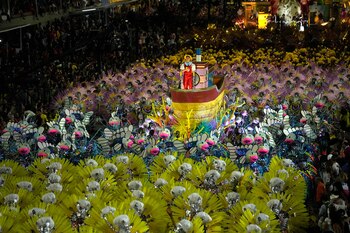
The carnival in Rio de Janeiro buried this Friday two dark years of COVID with a burst of euphoria that made the emblematic Sambadrome rumble, once again turned into a mecca of samba and fantasy with capital letters.
Some 70,000 people accompanied the dazzling floats and armies of dancers who shook their bodies and sang at the top of their lungs in the open air enclosure, the same one that served as a vaccination center during the pandemic.
Princesses with feathers and wings, kings and queens with rotating crowns, flowers and suns so brightly colored that they illuminated the night... the parades of the traditional samba 'escolas' returned in full splendour after a long wait of more than two years.


“It seems that I am finally reborn, during the pandemic I felt very sad, I was getting sick, because I love carnival,” the experienced 70-year-old Tia Cléa, who has half a century of parades next to the Viradouro school, told AFP.
The current champion of the competition, Viradouro recalled the carnival of 1919, when samba schools did not yet exist, but the Cariocas turned massively to the streets to celebrate the end of the so-called Spanish flu, disguised as pierrots, columbians or the “black plague”.

“I took off my mask in an enveloping climate, gently supported my lips and kissed you in endless joy... Carnival, I love you! ”, the participants chanted euphorically, including Silvio Guimaraes, 56, wearing a completely black suit, with a bird's beak and doctor's briefcase.

“We are performing a carnival ball after a pandemic... in 1919. Today the most important thing is that we are here, many people would like it and could not,” he said, excited.
With a health crisis exacerbated by delays in vaccination, more than 660,000 people died of COVID-19 in Brazil, a figure second only to the United States.

It was “two years of great darkness in the world, each looking to himself”. Tonight “we have the possibility to show that we are happy even with all the problems,” said Latino Suarez, 45.
“Brazil without carnival is not Brazil,” he said.

George Floyd and 'Fora Bolsonaro'
The 12 samba schools that compete in the Sambadrome for two nights each tell their “entanglement”, a story rich in historical and cultural references previously rehearsed for months.
And this year the anti-racist struggle, very present in the world of samba, of popular origin and anchored in the favelas, returned strongly.
The “Resistance” entanglement of the Salgueiro school was inspired by the anti-racist protests that occurred after the death of American George Floyd and the Black Lives Matter movement.


The floats were adorned with references to Afro-Brazilian religions and giant fists invited the “Resistance”. An obelisk with the inscription “Racism” was shot down, unleashing applause from the public.
In the stands, the occasional banner was displayed that read “Fora Bolsonaro” alluding to the president, who will seek re-election in October.

“With the government of Jair Bolsonaro, racism is more humiliating because it comes from above,” said Claudia Nascimento, a 43-year-old cashier from Salgueiro.
Mistakes and minor incidents did not go unnoticed either. In the case of Viradouro, one of the main dancers lost a shoe at the worst moment: it was left lying in the middle of the catwalk while the jury evaluated the performance of its owner.

Fatal accident
This year, these associations with decades of history recovered some of the public funding that the former mayor of Rio, the evangelical Marcelo Crivella (2017-2020), abolished by rejecting this popular holiday.
But the private sector finances most of the parades, whose floats and garments amount to several hundred thousand dollars.
Safety, whose failures led to several accidents in the past, is also being targeted, after an 11-year-old girl died this Friday after being crushed Wednesday night by a float at the exit of the Sambadrome.




This year the mayor's office did not authorize street parades that are normally organized in parallel and add to the 'Cidade Maravilhosa' in musical ecstasy, but some smaller “blocos” performed their courtships, refusing to postpone the party for another minute.
The carnival also brought relief to economic sectors affected by the pandemic, such as the hotel industry, with occupancy around 78%, although with a fall in foreigners (14% of attendees, compared to 23% in 2020).
(Text by Eugenia LOGIURATTO and Anna PELEGRI - AFP//Photos: AFP and AP)
KEEP READING:
Últimas Noticias
Debanhi Escobar: they secured the motel where she was found lifeless in a cistern

The oldest person in the world died at the age of 119

Macabre find in CDMX: they left a body bagged and tied in a taxi
The eagles of America will face Manchester City in a duel of legends. Here are the details

Why is it good to bring dogs out to know the world when they are puppies




